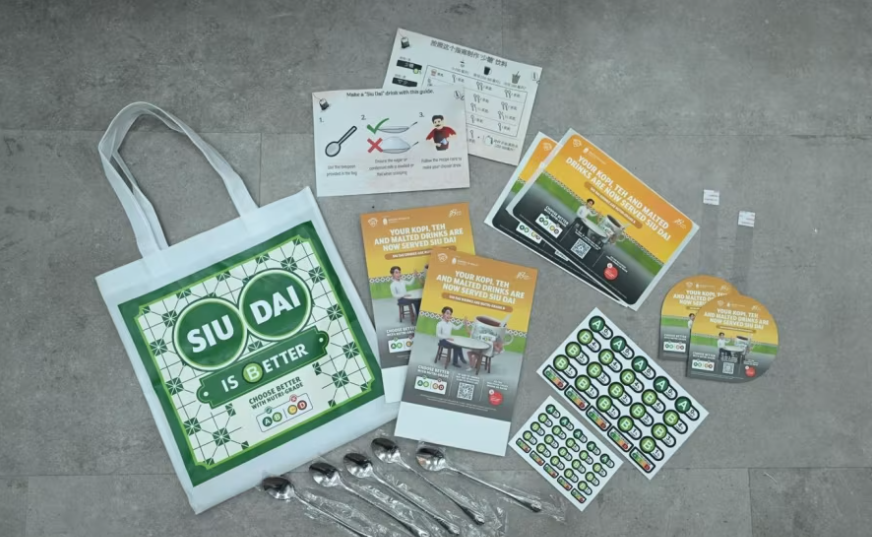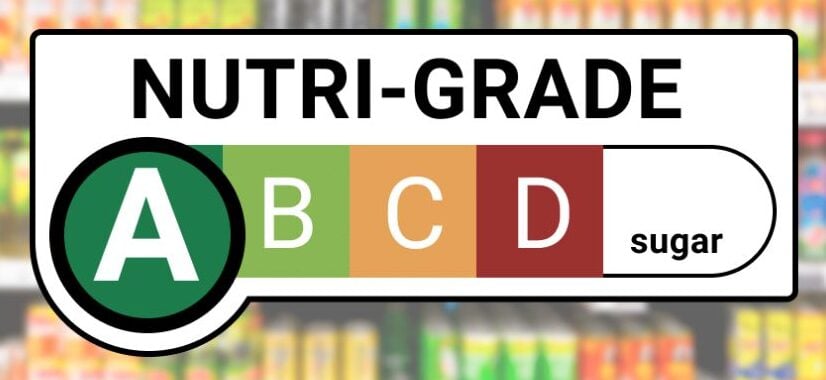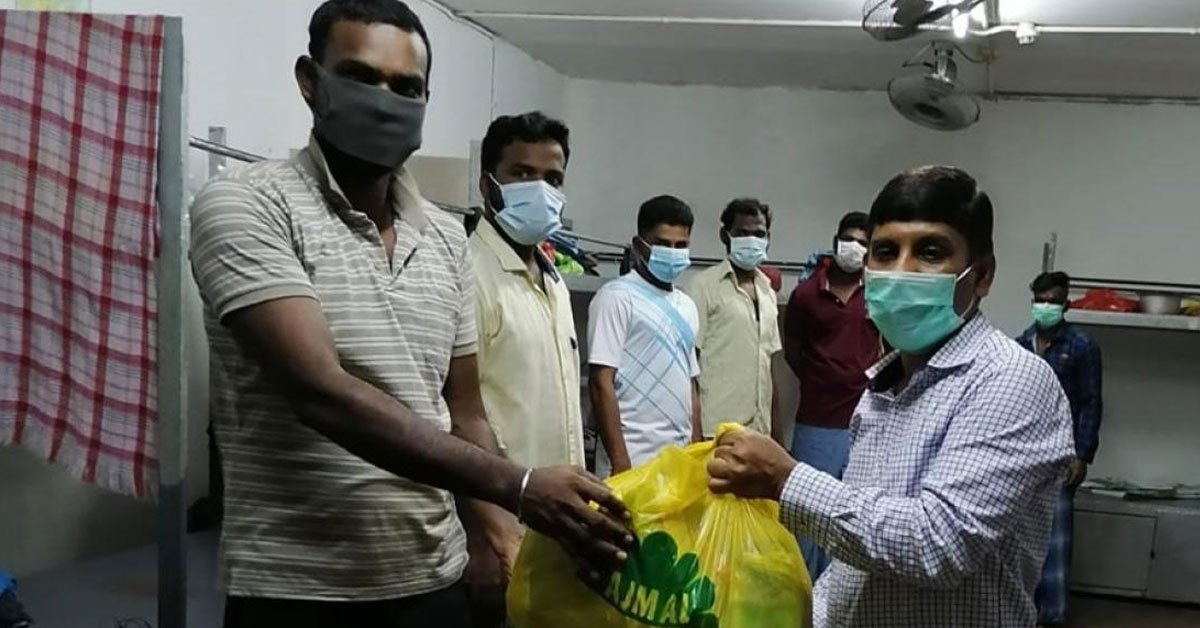If you’re not already getting 25% sugar for your bubble tea or “siu dai” (“less sweet” in Cantonese) for your coffeeshop drinks, you should.
And, even if you don’t want to, this will be the norm in the near future anyway, so why not start now?
“Siu Dai”, The New Norm
Two coffeeshop associations have pledged their support for the “Siu Dai by default” movement, which aims to make “siu dai” drinks the norm.
The Foochow Coffee Restaurant & Bar Merchants Association, and Kheng Keow Coffee Merchants Restaurant and Bar-Owners Association have both signed a joint statement of support, said the Health Promotion Board (HPB) on 1 March.
This movement was launched by HPB last September, and complements the Nutri-Grade labels, which have been in place for freshly made beverages since 30 December.
Reader: The Nutri-Grade labels are already in place? How come some drinks still don’t have the labels?
Read this article to find out more about why some drinks don’t have Nutri-Grade labels, or watch this video:
The “Siu Dai by default” movement encourages F&B operators to offer freshly prepared beverages, like teh (tea) and kopi (coffee), with less sugar as the norm.
Why This Needs to Happen
The World Health Organisation (WHO) has said that nutritionally, people do not need any sugar in their diet. While consuming sugar isn’t inherently bad, excessive consumption of sugar can lead to many health problems.
High sugar intake is linked to an increased risk of obesity and diabetes, which is the leading cause of kidney failure.
Moreover, the prevalence of obesity among Singapore residents has increased steadily over the years. While the prevalence of diabetes has stabilised over the past few years, it remains relatively high at about one in 12 Singapore residents.
On average, every day, six people in Singapore are diagnosed with kidney failure and may require dialysis.
According to Singapore health platform HealthHub, a normal order of kopi has four teaspoons of sugar, whereas kopi “siu dai” has 2.9 teaspoons of sugar.
Also according to HealthHub, our sugar consumption should be no more than 10% of our daily energy intake. For most adults, that’s about 10 teaspoons of sugar (based on a 2000-daily calorie intake).
If “siu dai” isn’t the norm, a single cup of kopi already accounts for 40% of your daily sugar intake!
And, I know you snack all the time. Let’s be real, we all get hungry and reach out for some biscuits, candy, or milo when studying or working, and all these contain sugar too.
It’s really not very hard for our sugar consumption to exceed recommended levels.
Both associations said they would work together with their members and strongly encourage them to offer beverages with less sugar, condensed milk, and evaporated milk as a default.
The associations will also work with HPB to drive greater acceptance of “siu dai” beverages among customers.
Don’t worry, if you feel like you need a pick-me-up on some days, you can always ask for “ga dai” (more sweet). Do this sparingly, though.
If not it kind of defeats the purpose of the movement.
“Siu Dai” Kits

To date, HPB has distributed 4,500 “siu dai” kits to drink stalls. These kits contain recipe cards for less sugar drink formulations and spoons for measuring the right “siu dai” sugar amount.
Stalls that are part of this initiative are easily identifiable by the “siu dai” decals and wobblers displayed at storefronts.
The two associations have more than 500 members altogether, and represent more than 50% of coffeeshops in Singapore.
Coffeeshops onboard this initiative will start serving their drinks “siu dai” by default.
Reader: Why can’t we just stick to the current system where people can ask for “siu dai” if they want less sweet drinks or “kosong” if they want drinks with no sugar?
You see ah, this is because Singaporeans are lazy.
Some people honestly can’t tell the difference between kopi and kopi “siu dai”, or think the difference is arbitrary. However, some of them can’t be bothered to add the two extra words “siu dai” when they order, and end up consuming more sugar even though they don’t actually mind the less sweet alternative.
This new initiative makes less sweet drinks the norm, while still letting people order “ga dai” drinks if they want something sweeter.
While Health Minister Ong Ye Kung acknowledged last September that this is a “matter of consumer habits and choice”, freshly made beverages with less sugar should be “the new norm and default”.
“Put the sugar at your stall, and if somebody wants to add sugar, let them add. But serve it with less sugar as a default.”
The total sugar intake has gone down in Singapore, and this is by no accident.
Since the announcement of the Nutri-Grade labelling in October 2019, the total sugar intake has decreased from 60g in 2018 to 56g in 2022.

HPB noted that sugar-sweetened beverages are the single biggest source of dietary sugar in Singapore, adding that more than half of Singaporeans’ daily sugar intake was from beverages.
This includes drinks containing added sugar and juices with naturally occurring sugars, of which 59% comes pre-packaged and 41% freshly prepared.
When choosing a drink to buy, you’re less likely to buy something with a Nutri-Grade C or D label, right?
Just like how your parents tell you you better not have any Cs or Ds on your report card. A is best, but B is also not too bad.
Similarly, nobody wants to drink something that’s Nutri-Grade C or D, that’s basically begging for diabetes. To most people, B is a decent and acceptable Nutri-Grade label.
Because more people started choosing drinks with a better Nutri-Grade label, many companies started doing research and experimenting on how to cut down sugar in their drinks as they did not want to lose too many customers.
Also, if drinks are Nutri-Grade A or B, they actually do not need to have the Nutri-Grade label, that’s why you mostly only see Nutri-Grade C or D labels.
It kind of makes these drinks stick out like red flags. And obviously, no company wants that.
This is why today’s drinks have lower sugar content.
Both the Nutri-Grade and “Siu Dai by default” initiatives aim to increase the availability and accessibility of healthier beverages, as well as to educate consumers on their options as well as the dangers of excessive sugar consumption.
Support the “Siu Dai by default” movement and start working towards a healthier diet, while still enjoying your favourite cup of kopi.



